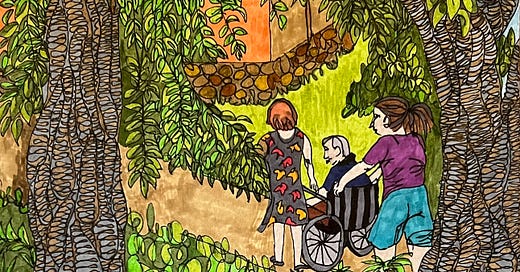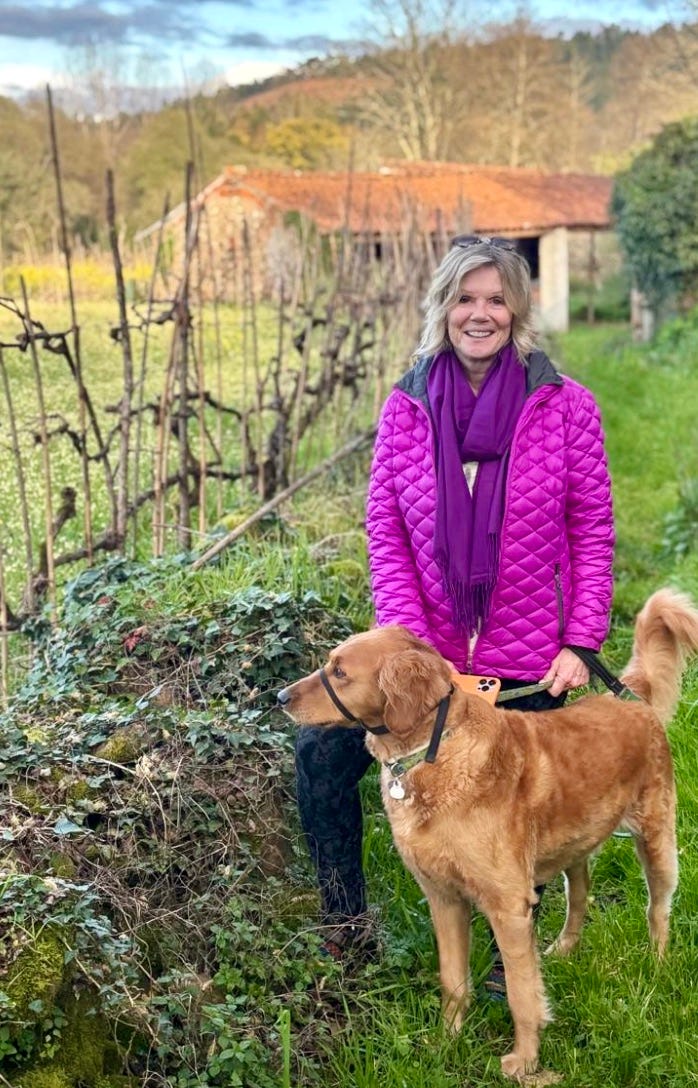Farmer Jaime Comes Home from the Hospital
Tales from a small village in Portugal
Among the many things that differentiate me from my Portuguese farming neighbors is that I almost always have my mobile phone in my hand when walking Kiitos through the village.
(Okay that’s two things, because almost nobody else walks their dogs around here.)
I carry it with me for a number of reasons, the most important of which is to be able to call for help should I get into an unexpected entanglement – stumbling and twisting my ankle and needing to call for help, or in case Kiitos comes under attack from another dog.
(Fortunately, that’s only happened once.)
I also carry it to listen to books, music and language lessons.
I also like to photograph the local crops, grapes, citrus trees, flowers, and irrigation methods, so I can hopefully learn something from them.
Most of all, however, I like to grab quick shots of memorable moments so I can sketch them later. Like the one above.
This sketch comes from a photograph I’ve been waiting to take for six months.
If any of the farmers around here have mobile phones, I have yet to see them in use. It’s very old world here. Instant communications exist in the form of shouts to other farmers, shouts at children and grandchildren, and shouted greetings from the fields as we pass by.
Last winter, however, farmer Jaime had a stroke while working in his field.
From farming tips to encouraging us to speak Portuguese, Jaime has always been especially kind to those of us who are foreigners in these small villages. He would even pull his truck over to say hello, then demand we speak only Portuguese to him in return – but he always said it with a smile. I would quickly exhaust the small collection of Portuguese vocabulary I had.
It wasn’t Jaime’s first stroke, from what I understand, but this was a bad one. Normally his wife, Isabella, works side by side in the fields with him, as most farming couples do. But she wasn’t with him at the time and he was unable to call for help.
I’m not sure anyone knows how long he lay in the field before Isabella discovered him and ran down the road to a neighbor’s house, crying out for help.
During the following months, whenever I was out walking Kiitos in the evening and saw her, I would get an update on farmer Jaime’s progress, either through the translation app on my phone (another reason I always carry it), or via one of their granddaughters, both of whom speak a little English. Isabella and I always exchanged hugs. She was often in tears.
They told me the doctors did everything they were able to do but they were unable to save one of his legs and had amputated it below the knee. He’d also lost the ability to speak.
“What about his farm?” I asked. “His animals?”
They shrugged. The family and neighbors were taking care of what they could, as best they could.
The months passed. Spring came, gradually morphing from rainy days into a hot Portugese summer. And then one evening last week, I turned a corner in the village and there he was, out for a stroll. Farmer Jaime was back in the village, sitting in a wheelchair while Isabella, wearing a festive dress for the occasion, walked by his side and an aide pushed his wheelchair up the road.
Seeing me, they paused. I told him how happy I was to see him back in the village and he nodded. I also told him I had begun taking Portuguese lessons. That brought a faint smile to his lips. So he remembers, I thought. This gives me added motivation.
After a short conversation with Isabella and the aide, we carried on in different directions. Glancing back, I pulled out my mobile phone and grabbed a quick shot of the three of them, framed by cork trees and wild ferns, just to remember the moment by.
Original art by Kristin Fellows
Kristin Fellows is a published artisan writer, illustrator, world traveler, and well-seasoned documentary film consultant. This tale comes to you from a small farming village in Portugal, where she is still surprised to find herself living and baking.
When not writing, Kristin can often be found walking Kiitos, writing or baking.
More about Kristin @ kristinfellowswriter.com
[photo of Kristin & Kiitos by Liza Debevec]






This slice of life is like the piece of watermelon I had last night, bright red with a former life, sweet and juicy, a few seeds, and wrapped in a tough hard skin of a different color. Maybe others can't see the connection but that's what came to my mind after I read your post - a taste of life from a small village. These are the places where people know one another, help one another and do what needs to be done. Thanks, Kristen, for both a good story and the accompanying image.